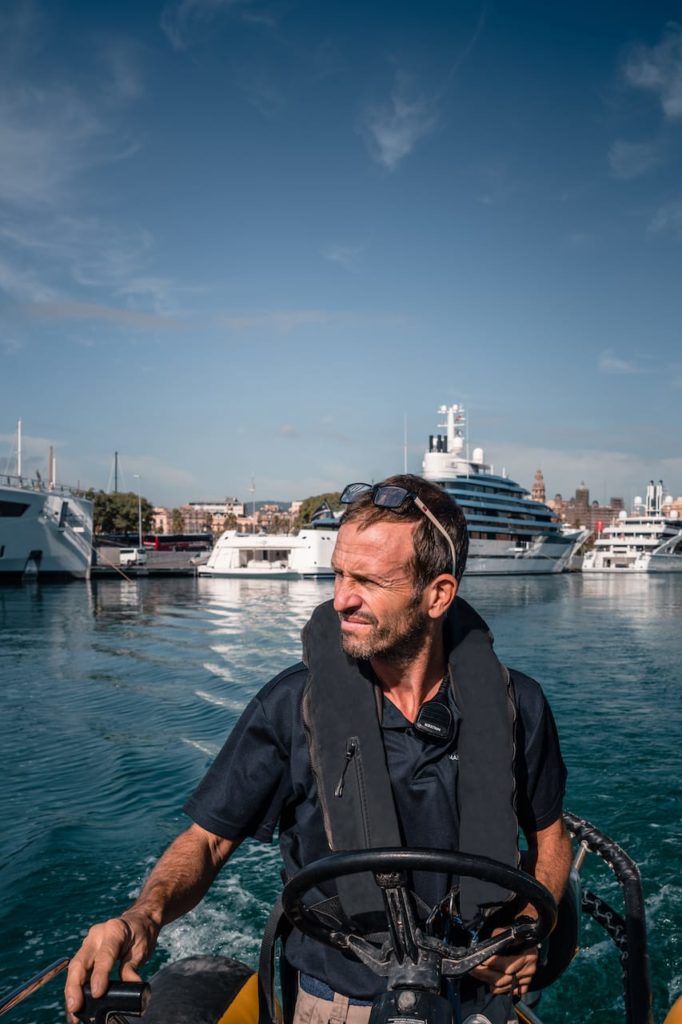
Rafael Bustos
Boatswain of Marina Port Vell Barcelona
After more than 30 years of experience at sea first in the army and then as a sailor in Marina Port Vell Barcelona, Rafael Bustos is one of the key figures that makes the excellence in the service offered by his reference infrastructure for large yachts located in the iconic neighbourhood of La Barceloneta possible.
SPONSORED BY:

When did you start working in Marina Port Vell, Barcelona?
It was at Christmas, 1994 and the marina needed a sailor for night watch. That’s how my story linked to this infrastructure began. I was 22 at that time.
How do you remember your first experience in the marina?
I entered with great enthusiasm. I came from the army after spending a few years as a navy diver and it was a great opportunity for me. I have very good memories of when I started, and I many experiences, both good and not so good ones. You can learn from ever situation, and if you put the balance on the scales, the result is positive. I can say that I work in what I like.
What has it meant for you to work in an infrastructure such as this on?
On a personal level, I am proud to be the boatswain of one of the leading ports in the Mediterranean. I feel as if I were in Barça and that gives me great satisfaction. I got to where I had always dreamed of being, and I am in a company where I feel useful and in which we are a family. We work with very high service quality and standards, and this motivates me a lot.
What do you think the marina brings to the city of Barcelona and, more specifically, to the neighbourhood of La Barceloneta?
The crews of the boats that dock at the marina, spend the winter here and do not change Barcelona for any other destination in the world. They appreciate that Marina Port Vell offers them the ability to be in the centre of a big city, with an atmosphere only few minutes away, seven days a week. They are large crews that spend money in the neighbourhood shops, and even rent apartments in the area in case of a longer stay. In the end, it is an economic contribution to the city and the neighbourhood. Not to mention the proximity of the MB92 shipyard, which makes spare parts for boats available within 24 hours.
Your father also worked here, didn’t he? What was it like to live the profession since you were a child?
The sea has been part of my life since I was very young. My father joined the marina in 1992, but my grandfather had already worked at sea, being a merchant. His brothers were soldiers and second lieutenants at the navy. Long story short, the work of a sailor is a world I have experienced first-hand.
What exactly are your duties?
The tasks I perform in the marina are the coordination of the seafaring and diving team. From cleaning the docks, paperwork, coordinating the work crews, ensuring the safety and health of the employees, etc. One of the areas I would highlight from my job is diving. We talk about the maintenance of the installations (shackles, ropes, chains, anchor braids, etc.) to avoid wear and tear that can incur risks, since neglecting it could cause a boat to collide with the dock.
Has your work changed over the years?
The marina when it started was designed to accommodate 35- or 40-meter boats, with 485 moorings all full of small yachts. Moreover, at that time many people lived in the marina all year round and it was like a village. However, the natural evolution of the sector has led to an increase in lengths and the marina has adapted to these demands. We are currently one of the few ports capable of accommodating vessels up to 190 meters in length. This increase in length has meant a change in the work of seamanship because it requires more knowledge and new requirements such as, for example, electrical connections. Before we could do it with a domestic plug and now, we are talking about very high powers that require personnel specifically trained for it.
Tell us about an experience that has been special for you throughout your professional career in the marina.
A great challenge that I remember were the fairs and shows that took place in the marina. I had the opportunity to work in the first floating boat show held in Barcelona and each of its editions has provided us with great experiences. I would also highlight the MYBA, which has taught us that nothing is impossible and that even if when it seemed we had no room for more boats, we managed to find it. I take all the events as a great learning experience.
